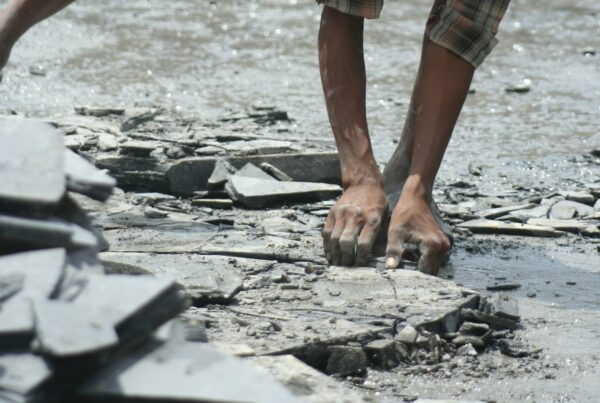Our new report examines the employment and working conditions in Rajasthan’s sandstone and marble Industries from a caste perspective.
Business activities around the world can pose significant risks to workers, their communities and the environment. In industries such as stone extraction, where exploitative working conditions are prevalent, marginalised communities bear the brunt of these impacts. A new report by Arisa and the Centre for Labour Research and Action (CLRA) sheds light on the experiences of marginalised caste communities in Rajasthan, India, where workers are trapped in dangerous, low-paid and informal jobs.
Caste-based discrimination and exclusion are often fundamental drivers of widespread labour rights violations. Companies operating in or sourcing materials from caste-affected regions need to be aware of these risks and take steps to address them. Failure to do so can undermine the effectiveness of companies’ due diligence efforts.
Research focused on two key areas: Budhpura, known for its sandstone cobbles, and Makrana, famous for its marble. Both clusters export widely, but workers, mostly from oppressed caste communities, remain trapped in exploitative conditions. Interviews with 200 workers reveal widespread problems of informal employment, low wages and unsafe working conditions.

Informal employment
Both the sandstone and marble industries in Rajasthan are characterised by a high incidence of unorganised workplaces and informal employment relationships. The vast majority of workers interviewed are employed on an informal basis, with no contracts, pay slips or any other proof of employment. These informal arrangements leave workers unprotected, without access to benefits or social security, and make it difficult to obtain compensation in the event of work-related injury or illness.
Risks of bonded labour
Economic hardship and limited educational opportunities place marginalised caste groups at high risk of bonded labour. Arisa and CLRA’s research shows that bonded labour is present in both the Budhpura and Makrana clusters. In Budhpura, half of the workers surveyed had taken advances from employers, and ninety per cent of them have to accept lower wages until the debt is repaid. In Makrana, forty per cent reported a similar reliance on credit, reinforcing cycles of dependency and limited social mobility.
Dangerous and unhealthy work
The study underscores a disturbing link between caste background and hazardous work. In both clusters, workers endure physically demanding conditions, often with limited protection from silica dust in Budhpura or from dangerous mine cave-ins in Makrana.
Companies must pay more attention to marginalised groups in their due diligence procedures
Although caste-affected communities are highly vulnerable to negative impacts of business activities, corporate human rights due diligence policies and practices generally neglect the issue of caste-based discrimination. Companies lack awareness of the issue and often overlook it in their risk assessments. Furthermore, companies typically do not engage with workers affected by caste-based discrimination or with organisations that support such workers. As a result, caste-based discrimination is often “invisible” as a root cause of other labour rights violations.
Companies operating in or sourcing materials from caste-affected countries need to be aware of the risks and take steps to address them in their supply chains. This is particularly critical in industries such as natural stone extraction and processing, where large numbers of workers from marginalised castes face heightened risks of forced labour and hazardous working environments. The report proposes concrete ways in which companies and other actors can address caste-based discrimination in supply chains.
The caste system
The caste system involves dividing people into social groups (castes) where rights are fixed, hereditary and determined by birth. Where the caste system exists, it permeates all aspects of life, determining where people live, what jobs they can do and who they can marry. In India, jobs and occupations have historically been assigned along caste lines. While people are now free to choose their occupations, the persistence of the caste system in all aspects of life ensures that caste-based divisions of labour continue, with oppressed caste communities still relegated to the most hazardous and poorly paid roles. People from caste-affected communities are over-represented in the informal economy, while the dominant castes dominate regular formal sector employment.
Download the Caste in stone report



